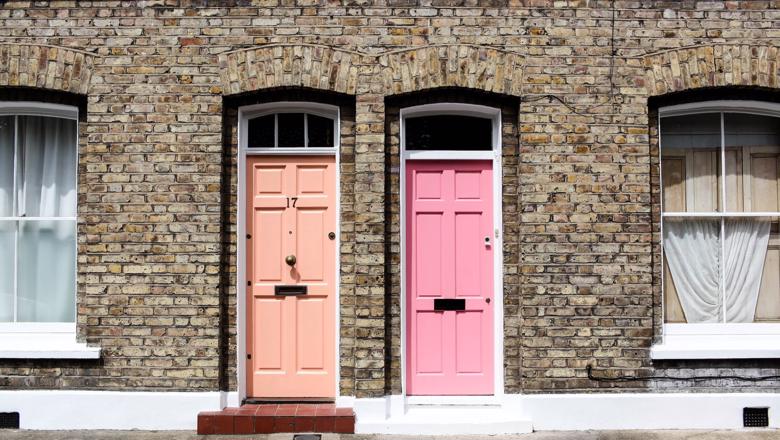27 April 2023
UK public among most trusting of their neighbours internationally and increasingly comfortable living next to historically marginalised groups
The UK public is among the most relaxed about living next to a wide range of people

Love thy neighbour? Public trust and acceptance of the people who live alongside us
Read the research
The UK now has some of the highest levels of neighbourhood trust internationally, while Britons have also become much more comfortable with having neighbours who belong to historically marginalised groups, such as gay people, those of a different race, immigrants, and people who have AIDS.
Research by the Policy Institute at King’s College London finds the liberalisation of social attitudes in Britain is reflected in changing views of who the public say they would not like to have as neighbours, with attitudes softening towards several groups.
Of around 20 countries included in the study, the UK now ranks as the most, or among the most, relaxed about living next to a range of people – including those of a different religion and those who speak a different language.
However, this increasing tolerance does not extend to all in society: compared with when trends began, the public have in fact become less open to people who are addicted to drugs being their neighbours, while a majority still take issue with heavy drinkers.
The analysis was carried out as part of the World Values Survey (WVS), one of the largest and most widely used academic social surveys in the world, in operation since 1981.
The groups asked about, as well as the terms used to describe them, therefore reflect the priorities and language of different eras, yet have not been altered given the value of tracking long-term trends in public opinion.
The latest UK data was collected in 2022, with data for other nations collected at various points throughout the latest wave of the WVS, which spanned 2017 to 2022.
The UK has some of the highest levels of neighbourhood trust internationally
Out of 24 countries, the UK (84%) ranks behind only three – Egypt (86%), Sweden (89%) and Norway (90%) – for levels of trust in the people in their neighbourhood.
Other peer nations fare worse on this measure, such as the US, where 72% say they trust the people in their neighbourhood.
And unlike the US, where trust fell from 80% in the mid-2000s to 72% in 2017, the British public’s trust in their neighbours has risen, from 78% in 2005 to 84% in 2022.
Trust also varies geographically within the UK:
-
Northern Ireland (90%) is the UK nation where people are most likely to trust those in their neighbourhood, ahead of England (84%), Scotland (81%) and Wales (81%).
-
In England, people in the South West (93%) are the most trusting of their neighbours.
Britons have become much more comfortable with some – but not all – historically marginalised groups being their neighbours
In 1990, nearly a third (31%) of Britons said they would not like to have homosexuals as neighbours. By 2022, this had fallen to 4%.
Similarly, in 1990, a quarter (23%) of the public said the same about people who have AIDS – a figure that has also now declined to 4%.
Looking further back, between 1981 and 2022, the share of the public who cited immigrants/foreign workers decreased from one in eight (13%) to 5%.
And over the same period, the proportion who said they would not like to live next to people of a different race dropped from one in 10 (10%) to just 1%.
However, attitudes towards two groups have hardened or at least remained very negative:
-
In 2022, 83% of Britons said they would not like to have drug addicts as neighbours – far higher than the 63% who said the same in 1990.
-
The proportion who say they’d rather not live next to heavy drinkers has risen from 48% in 1981 to 57% in 2022 – although this is less of a clear upward trend.
In both cases, there has been a notable increase in people feeling this way since 2018.
The UK public rank as the most, or among the most, accepting of a range of different groups
Of nearly 20 countries, the UK emerges as the most comfortable with the idea of having various groups as neighbours:
-
4% of the UK public say they would not like to live next to people who have AIDS, with only Germany (6%) and Brazil (6%) coming close to such levels of acceptance.
-
Similarly, the UK (4%) ranks as the least likely to take issue with someone who speaks a different language being their neighbour. Other higher-income democracies such as Greece (14%) and Australia (10%) fare worse on this measure.
-
Only 1% of the UK have a problem with unmarried couples or people of a different religion being their neighbours – the lowest among nations analysed.
Of a larger sample of more than 20 countries, the UK is also among the most comfortable with the prospect of neighbours who belong to other groups:
-
The UK (4%) ranks alongside Sweden (3%) and Norway (2%) as the most relaxed about the idea of having neighbours who are gay.
-
People in the UK (2%) are among the least likely to say they’d prefer not to have neighbours of a different race, on a par with those in Brazil (1%), Sweden (1%) and several other western nations.
-
Other high-income democracies, such as Italy (18%), Spain (13%), France (10%) and Australia (9%), are all more likely than the UK (5%) to have a problem with their neighbours being immigrants.
But by international standards, the UK ranks as somewhat less tolerant of frequent drug users or drinkers:
-
83% of the UK public say they wouldn’t like to live next to drug addicts, with the country less accepting of this group than the likes of Spain (61%), France (57%), Norway (57%), but more accepting than Australia (94%), the US (92%) and others.
-
A majority of 57% in the UK say they would not like to have heavy drinkers as neighbours – lower than in some peer nations, such as Canada (80%), but much higher than others, such as Norway (29%) and France (41%).
Perceptions of neighbourhood safety and quality of life
The research also explores the quality of neighbourhood life and finds the UK fares worse than some comparable nations on perceptions of how often illegal or anti-social behaviour takes place.
For example, people in the UK (28%) are four times as likely as those in Germany (7%) to say that drug sales happen very or quite frequently in their neighbourhoods.
And the UK is on a par with the US for perceptions of how often robberies (UK 21%; US 21%) and street violence and fights (UK 14%; US 16%) take place.
But the UK does fare better on perceptions of sexual harassment, police or military interference with people’s private lives, and racist behaviour. On the latter, 13% in the UK say this is a frequent occurrence in their neighbourhood, compared with 24% in the US.
Professor Bobby Duffy, director of the Policy Institute at King’s College London, said:
“The UK public are highly trusting of the people in their neighbourhood and very comfortable being neighbours with a wide range of groups, compared with many other nations and our own past views.
“It seems absurd that as recently as 1990 nearly a third of people in the UK said they’d be uncomfortable with gay neighbours, but this is now down to just 4%, and reflects a wider rapid change of attitudes, shown in increased acceptance of people from different races and immigrants. These shifts have been seen in other countries too, but the UK has often shifted more than many others, putting us now among the most open countries in the study.
“This does not apply to neighbours engaged in illegal or anti-social behaviour, however, with drug users in particular the least welcome, and the UK more hardline on this than many other countries.
“Our high levels of neighbourhood trust and tolerance are somewhat at odds with relatively widespread experience of local illegal or anti-social behaviour – for example, 28% of us say we’ve seen drug dealing in our neighbourhood, which is on a par with the US and compares with 7% in Germany.”
Technical details
2022 UK data comes from a random probability sample of 3,056 adults aged 18+ interviewed by Ipsos through a mix on face-to-face and online survey methods. Data has been weighted by region, education and age interlocked with gender to be nationally representative.
For analysis of trends over time, data is nationally representative for Great Britain due to a lack of available trend data from Northern Ireland, and is based on surveys of 1,000 or more people aged 18+.
Samples for other countries are all nationally representative and made up of at least 1,000 people. Information on the sampling methodology these nations is available via the World Values Survey Association website.
Data produced for this research is used in wave 7 of the World Values Survey, which included around 90 countries and ran from 2017 to 2022. See the full report for the precise year each country was surveyed. The report focuses on a cross-section of 24 countries selected based on the availability of reliable and weighted data and then narrowed down, focusing on global coverage (based on the UN's standardised country coding system), regional coverage and population size. This selection gives coverage of 12 of the 17 UN M49 geographic regions across 24 countries, representing almost 50% of the world's population (source: World Bank). Not all questions are asked in each country in every wave of the study, and so the number of countries compared on each question can vary.

